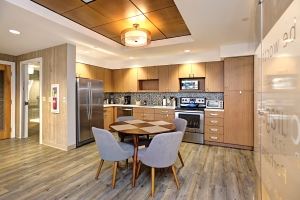Cooking in Post-acute Rehab!
- Category: Short-Term Rehab
- Posted On:

She reaches for the cooking oil on the top shelf of the pantry to make a breakfast omelet; she bends down to take a load of laundry out of the dryer; she just finishes brushing her hair in the bathroom mirror. The kitchen, living room, bathroom, and bedroom are beautifully decorated in a mid-century style with abundant light and all the comforts of home. But it is not home. She was recently discharged from the hospital. Now, she works side-by-side with her occupational therapist or physical therapist in this specially designed Transitional Care Suite in the Bolger Gym & Wellness Center at Christian Health (CHCC) in Wyckoff, NJ. It’s all a part of patients’ daily therapy, preparing them to return home or to independent living. It gives patients a chance to relearn daily activities in a safe environment, under the guidance of their therapist, in a space that resembles home. For post-surgical patients or for those with new assistive devices, the challenges of activities of daily living can be daunting: walking over rugs, putting fitted sheets on the bed, getting in and out of bathtubs, turning knobs, opening heavy doors, and going up and down steps. They can all present a challenge after hospitalization. The Transitional Care Suite allows for therapists to provide more functional-based treatments for patients. The functional-based treatment helps patients rehab to their highest level of functional mobility in preparation for discharge.
The Transitional Care Suite includes a kitchen/dining area, family room, laundry room, bedroom, and bathroom. The kitchen allows the therapists to incorporate functional activities of daily living into the therapy sessions. The patients are able to focus on meal-preparation skills from start to finish, including cleaning up with the dishwasher, mop, and vacuum, as well as setting and clearing a table. Additionally, they can work on cognitive skills, such as recipe reading and preparing shopping lists for a trip to the grocery store. In the bedroom, patients can practice bed-mobility skills on a regular bed rather than a hospital bed. They can work on changing bed linens, and washing, sorting, and putting away laundry into the closet and dressers. In the bathroom, the Transitional Care Suite offers both a walk-in shower, as well as a tub-and-shower combo. This allows for patients to practice shower transfers with whatever style shower they have at home.
 The design team for the Transitional Care Suite wanted to provide a space within the Bolger Gym & Wellness Center that afforded privacy and felt like home. The team included an architect, interior designer, rehab therapists, student interns, administrative leaders, and input from current and former patients. It includes a fully-equipped functional kitchen, dining room, living room, bedroom with a queen-size bed, washer and dryer; and bathroom with a tub and a shower. The interior design replicates the comforts of home, as well as the challenges found at home following a hospitalization.
The design team for the Transitional Care Suite wanted to provide a space within the Bolger Gym & Wellness Center that afforded privacy and felt like home. The team included an architect, interior designer, rehab therapists, student interns, administrative leaders, and input from current and former patients. It includes a fully-equipped functional kitchen, dining room, living room, bedroom with a queen-size bed, washer and dryer; and bathroom with a tub and a shower. The interior design replicates the comforts of home, as well as the challenges found at home following a hospitalization.
This space is also beneficial for family and caregiver education. CHCC can help train caregivers in order to plan for discharge, and a safe transition back home. CHCC educates them on the proper placement of such things as grab bars, as well as showing them different types of durable medical equipment that is available for patients when they return home. The suite allows CHCC to replicate the patients’ home environments to focus on skills needed to function and to return home safely, and successfully complete daily activities. It also allows the Center to train caregivers if patients are unable to return home independently, so the continuum of care is followed upon discharge. The Transitional Care Suite is able to be utilized by all skilled therapists no matter what their discipline. Speech therapists can focus on cognitive skills, occupational therapists can work on activities of daily living training and home management, and physical therapists can incorporate balance and coordination training. The Transitional Care Suite allows patients to clearly see the focus and purpose of the skilled treatments and it helps them take an active role in creating their treatment plan, as well as long- and short-term rehab goals.
Having more functional-based treatments helps to improve the carryover from the sub-acute setting to home. The Transitional Care Suite allows patients to practice these activities of daily living in a more home-like environment. Therefore, it helps therapists to gauge the level at which the patient will be able to perform the task at home based on the level they are able to perform it in the Transitional Care Suite. It also helps the therapist to assess whether the patient is truly independent with an activity, or whether they need to recommend getting help at home. When the level at which the patient will perform at home can be more accurately assessed, the therapist can put measures and help into place to keep them at home safely and decrease the occurrence of re-hospitalization.
The Transitional Care Suite is truly an innovative program that helps to enhance the quality of life through the different therapies utilized in the suite and allows CHCC to deliver the highest standard of care to rehab patients.
